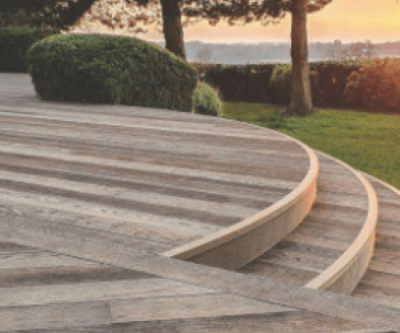- Turf
- Artificial
- Soil
- Timber
- Composite Decking
- Paving & Stone
Get In Touch With Our Experts Today!
Give us a Call! - Seed & Fertiliser
- Dressing
- Bark

February 21, 2025
One of the great benefits of composite decking is that, although it looks exactly like real timber, it doesn’t bring the challenges of natural oak, such as rotting, warping or slippery surfaces! But, to get the most from your decking, regular care and maintenance, especially after wintery weather, will keep it looking smart and ready to use when the sun finally arrives.
Whether you’re a homeowner looking to preserve your decking investment or a landscaper assisting clients in caring for their Millboard, this article is for you. We’ve pulled together the ultimate checklist for assessing your composite decking after winter, and making sure it’s ready to use come spring.
It may seem obvious, but a swift sweep of your composite decking will allow you to see exactly what you’re working with. We recommend washing the surface with warm, soapy water and a sponge. This will lift any surface stains and reveal anything that needs a bit more elbow grease. A quick wipe-down of your decking will also enhance its appearance, whether you’re outside or not.
Start by scanning your decking for any signs of damage, such as cracks, dents, scratches or chipped paint. Although composite decking is extremely resilient in extreme winter conditions, storms can still cause minor damage. Most scuffs can be washed away with soapy water or Millboard’s decking touch-up paint. For anything more substantial, you can order replacement boards or contact the team for further advice.
The ends and edges of composite decking boards are most exposed to bumps, scuffs and weather conditions. This makes them highly vulnerable spots. Use our touch-up paint to cover any chips or scratches, and check the fixtures and fittings remain tight to your subframe to avoid any loose boards or space for them to shift.
If accessible, it’s a good idea to check all screws, nails and fasteners in your subframe. Yes, the Lastane coating on Millboard decking flexes over the screw’s head to provide a layer of protection. However, freeze-thaw cycles can loosen fixes, and boards could potentially shift. It’s always best to double-check after a particularly harsh winter.
If installed correctly, your composite decking should have zero water pooling. If you notice water collecting on the surface of your deck, it could be that your decking boards or subframe has shifted or the usual drainage route is clogged up. Start by checking the level of your deck by using a spirit level. If your deck structure has moved, you may need to strengthen the subframe or foundations. Usually, water pooling can be resolved by checking the draining outlet and clearing it of any winter debris. Clear up surface water and keep an eye on it.
This is a common problem for those who opted for a timber frame rather than the recommended Millboard subframe. As a natural material, timber absorbs moisture, whether rain, frost or melted snow. If it doesn’t thoroughly dry out, this can lead to mould and mildew growth. Check under your decking, and if you spot any dark or fuzzy patches, use warm, soapy water to scrub them away.
Slowly walk around your decking and note any soft spots where the boards dip or feel weak. If sections feel unstable, remove any furniture in the area and inspect the subframe. There could be the chance of rusting hardware or potential rot or insect damage if you have a timber subframe. If you spot anything, be sure to resolve the issue before using your decking.
Explore our top-quality Millboard composite decking options below:
Post-winter (February and March) is the perfect time to inspect the condition of your composite decking. By this time, the majority of snow, frost, rain, wind, and storms have passed, and you can thoroughly inspect any damage. This also gives you time to plan any necessary repairs before peak season. If your decking is continuously in use, for example, in a communal area, we recommend clearing and checking your composite decking regularly. Both for user safety and to keep it neat, tidy, and looking as pristine as possible.
Although Millboard decking is highly durable with a fantastic lifespan, it’s only as good as you treat it. By taking the necessary measures to care for it, your composite decking will look immaculate all year round.
We recommend scheduling regular checks of your composite decking to keep it in ready-to-use condition. This will also help spot warning signs of damage and avoid serious issues that could result in costly repairs. For more information or helpful advice, check out our blogs below or speak to our friendly customer services team.
For our landscapers, you can purchase your Millboard supplies online, over the phone or via our St Albans branch – where your client can also view our stunning Millboard range in situ. Be sure to check out our Trades Account, too, for additional support and benefits when partnering with George Davies – the landscaper’s choice!
CALL US NOW ON 01234 818 253